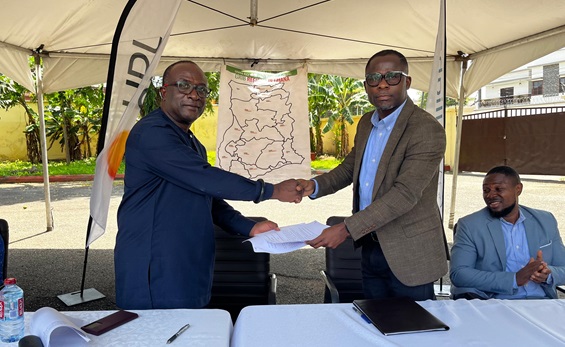Tags
Two partner to enhance rice value chain
Elizabeth Nyaadu Adu

THE Ghana Rice Inter-Professional Body (GRIB) and Callighana Company Limited have signed a Memorandum of Understanding (MoU) to maximise rice yields and income of farmers.
Under the agreement, Callighana will provide farmers across the country with its agricultural inputs like improved hybrid seeds, and agrochemicals and offer rice farmers with training on good agricultural practices (GAP).
This will ensure that farmers get access to quality inputs at the right time to help bridge the production gap.
Signing on behalf of rice farmers, the president of GRIB, Nana Kwabena Adjei Ayeh II, expressed frustration with the current state of the rice sector and a belief that progress required direct intervention from the private sector.
According to him, the strategic partnership with Callighana will help solve agelong challenges of access to agrochemicals.
“With Callighana coming on board, we are assured of quality products at competitive rates, which will boost our yields. We the farmers have changed our mindsets from being just mere farmers to being business people. As such, we are taking calculated steps to maximise our yields and incomes.
We recognise that interventions such as this are what we as farmers require to grow into an efficient and productive sub-sector,” he said.
Nana Ayeh affirmed GRIB’s commitment to work tirelessly to boost rice production in the country, adding that “as business-oriented farmers, we cannot continue to thrive on free handouts from governments and donor partners. It is initiatives and partnerships such as this that will drive the value chain to its heights.”
Low productivity
The rice industry in Ghana has historically struggled to meet the nation’s growing demand; meeting only 50 per cent of its rice and low productivity (two to three tonnes compared to the global standard of five to six tonnes) and draining foreign exchange reserves.
Despite being a staple in the Ghanaian diet, the reliance on rice imports remains high.
Factors such as outdated farming techniques, lack of improved seeds, limited access to modern agricultural technology and insufficient irrigation systems have contributed to this predicament.
Agric modernisation
To address the insufficiency in rice production that has gripped the agricultural landscape of Ghana, the Managing Director of Callighana Company Limited, Bernard Buertey Okutu, said it is imperative to embrace agricultural modernisation.
That, he said, involves implementing advanced farming practices, introducing cutting-edge technology and providing farmers with the necessary tools and knowledge.
“The rice industry in Ghana has long been confronted with challenges, leading to a significant gap between demand and supply. However, through strategic agricultural modernisation, players in the sector have the potential to bridge this gap and pave the way for a self-sufficient and thriving rice sector,” he said.
Mr Okutu said by embracing improved hybrid seeds and technology, promoting sustainable practices and empowering our farmers through training, the country can build a self-sufficient and resilient rice industry that not only meets the nation’s demand but also contributes to the overall economic development of Ghana.
https://www.graphic.com.gh/business/business-news/two-partner-to-enhance-rice-value-chain.htmlPublished Date: November 26, 2024






